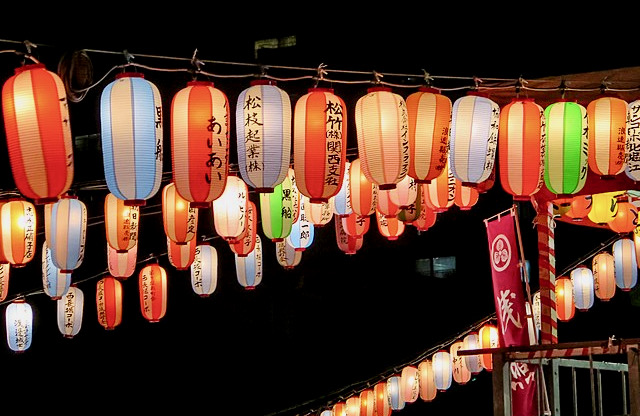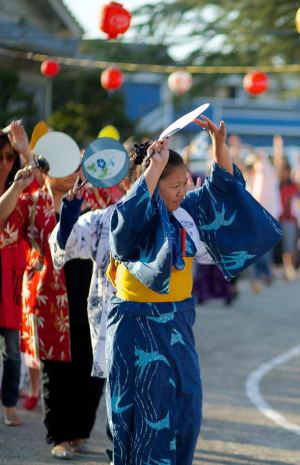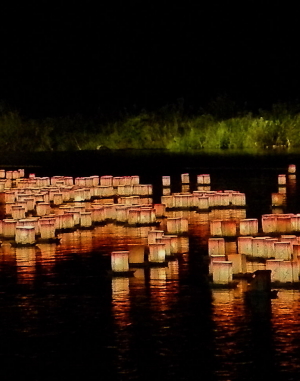
Photograph by Jim Kamole, shared via Wikimedia Commons.
.

Although many festivities for Obon will be virtual this year, celebrations typically include vibrant colors and dancing for everyone. Photo by –Mark–, courtesy of Flickr
MID-JULY through MID-AUGUST: A festival of ancient dances, intricate costumes and a celebration of Japanese culture commences, as the spirit of Obon circles the globe. Worldwide, this festival spans an entire month: “Shichigatsu Bon,” celebrated in Eastern Japan, begins in mid-July; “Hachigatsu Bon” commences in August; “Kyu Bon,” or “Old Bon,” is observed annually on the 15th day of the seventh month of the lunar calendar.
2021 update: Due to the continuing COVID-19 pandemic, many dance festivals will be held virtually this year. The New York Buddhist Church, for example, will offer a range of “celebratory and remembrance demonstrations” online, July 9-1 (read more here). From Hawaii, the Kaua’i Soto Zen bon dance will be virtual again, this year (learn more here); similarly, dancer-members of the Wahiawa Hongwanji are preparing for a 2021 virtual bon dance (watch a slideshow of dance rehearsals, here).
Meanwhile, experts are expressing concern over the lack of vaccinated Japanese residents—according to reports, although Japan’s vaccine coverage has been increasing in recent weeks, the country’s number of vaccinated residents is still the lowest among the world’s most developed nations—as both the Olympics and Obon season approach.
ANCESTORS, BUDDHISM AND HOUSEHOLD ALTARS
Born of Buddhist tradition and the Japanese custom of honoring the spirits of ancestors, Obon is a time for homecomings, visiting family gravesites, dances, storytelling and decorating household altars. Light cotton kimonos, carnival rides and games and festival foods are common at during this season. Obon has been a Japanese tradition for more than 500 years.
STORYTELLING & A DISCIPLE OF BUDDHA
“Obon,” from Sanskrit’s “Ullambana,” suggests great suffering, as the full term translates into “hanging upside down.” Bon-Odori—and the Buddhist legend it stems from—recall a disciple of Buddha who used supernatural abilities to look upon his deceased mother. When the disciple saw that his mother had fallen into the Realm of Hungry Ghosts and was suffering, he asked Buddha how he could help her. The disciple made offerings to Buddhist monks who had just completed their summer retreat and, soon after, saw his mother released from the Realm of Hungry Ghosts. With his new-found insight, the disciple suddenly saw the true nature of his mother—her selflessness, and the sacrifices she had made for him—and with extra joy, he danced what is now the Bon-Odori. (Get a Buddhist perspective here.) A primary purpose of Obon is to ease the suffering of deceased loved ones while expressing joy for the sacrifices loved ones have made.
A taste of Obon: Looking for recipes to celebrate Japanese culture? The Spruce Eats offers a variety of Japanese cuisine suggestions, suitable for Obon.
The official dance of Obon, though it follows a universal pattern, differs in many details by region. Music and steps typically reflect a region’s history, culture and livelihood. In addition, some regions incorporate items such as fans, small towels or wooden clappers into the dance, while others do not. Nonetheless, everyone is welcome to join in the Bon-Odori dance.
When the festival draws to a close, paper lanterns are illuminated and then floated down rivers, symbolizing the ancestors’ return to the world of the dead (Toro Nagashi).
OBON AROUND THE WORLD
Outside of Japan, the festivities of Obon resonate (though primarily virtually, this year) through Brazil—home to the largest Japanese population outside of Japan—as well as in Argentina, Korea, the United States and Canada. In Brazil, street Odori dancing complements the Matsuri dance, and Taiko (drumming) and Shamisen contests are held. Buddhist temples host events throughout the United States, and in Hawaii and California, events are abundant.


Tell Us What You Think